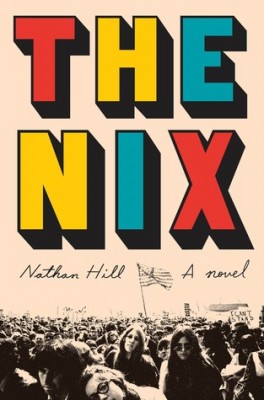
Not so long ago, warnings kept bubbling up about the imminent demise of the novel in an era of information supersaturation. In fact, we need the restorative space of books more than ever, especially the kind of deceptively profound and rollicking entertainment that Nathan Hill delivers with his debut novel, “The Nix,” a feat of levitation that wears its seriousness lightly and functions almost as smelling salts for the imagination.
Like Emma Cline’s “The Girls,” Hill’s 625-page joyride of a novel seeks both to anchor itself in a sensibility that is eminently contemporary, crackling with cool irony and flippant outrage, and to tunnel back into recent history with the preconception-shifting power that first-rate fiction has a unique power to summon. Cline revivified the murderous specter of Charles Manson and his “family,” and Hill tackles the Everest of ’60s lore: Chicago ’68.
We are pulled into the tumult in Grant Park, outside the hotel hosting delegates to the 1968 Democratic National Convention, a huge crowd of protesters facing off against tear gas and the club-swinging henchmen of the Chicago Police Department. The understated power of the writing conveys a deep sense of horror.
Hill understands that all great satirists have to start with deep empathy, even love, for all their characters, especially the ostensibly most vile, and we find ourselves on startlingly intimate terms with one rampaging cop who compares his actions at perverse length to Cubs slugger Ernie Banks’ home-run swing as he focuses on smashing heads.
“(T)he only information he has is the information that travels up the bat and into his hands, a percussion that feels just right,” he writes. “As if the ball has offered him no resistance whatsoever, so purely did he strike its exact middle with his bat’s exact middle. … Brown is thinking about this as he clunks hippies on the head with his nightstick.”
The comparison is monstrous and sickening — and explodes like a land mine, flinging a reader free of any tepid ruminations on Chicago ’68. For years, it’s been accepted wisdom that a rattled nation saw those protests as a disturbing case of hippies out of control, and mostly sided with the authoritarian crackdown of machine politician Mayor Richard Daley.
President Nixon took advantage of the yearning for order that year of change and rode it all the way to the White House, true enough, but the historical currents set in motion extended for decades. Hill’s deeper purpose lies in giving us a jolt that might lead to fresh answers to old questions.
That’s the larger context, which a reviewer is called upon to deliver, but this novel is no ponderous book-length think piece. Above all, it’s a deliciously fun excoriation of so much that demands to be excoriated, from contemporary college students puffed up on social-media-fueled entitlement to unctuous, self-congratulating brand consultants, delivered not via drive-by potshots but through old-fashioned portraiture that develops with the vividness and pace of an old-fashioned Polaroid.
It’s probably no overstatement to assert that to this day, we as a nation are haunted by the legacies of the ’60s, and Hill gets surprising traction with the ghost-story aspect of his yarn, looking at how a secret betrayal in the past can animate spirits that take an active interest in altering our present-tense lives. The title is a reference to a mythological Norwegian creature, taking the form of a white horse, that steals children away — or your Nix can be whomever you love most, who therefore can hurt you the most.
There is some of the fluid virtuosity and wide-canvas approach of a Jonathan Franzen, page after page of pitch-perfect riffing on the weird ordinariness of his oddball-next-door characters, and the violin-prodigy love interest of our main character, Samuel Andresen-Anderson, would feel at home in a J.D. Salinger short story. Hill earns comparisons to John Irving for his goodhearted caricature and dark view on media-driven groupthink, but his style does not feel derivative nor reactive.
Take Samuel. He’s neither an antihero nor a hero. He does not charm nor make a splash. About the main impression that comes through early is that he has grown up crying a lot and that even as an adult — a stalled writer stuck in a campus job teaching writing — he lives in horror of a full-on crying fit coming over him.
He was a big crier even before his mother abandoned him when he was a boy, and now as a diffident, video-game-addled adult who loathes his own life, he’s finally forced to go in search for answers about why his mother left — a search that funnels him inexorably back in time to the Chicago convention.
We care about Samuel less for who he is than who he is not, but we do care, as indeed we care for most if not all of the characters in this book. This feat Hill achieves with his moving evocation of Samuel’s boyhood experience of Bethany, a mesmerizing violin prodigy with whom he is instantly smitten, and her twin brother, Bishop, a boy of precocious swagger whose dark secrets will pull Samuel into a vortex that shapes his life. This is a novel about an understanding taking years to unfold.
“She’d decided that about eighty percent of what you believe about yourself when you’re twenty turns out to be wrong,” a character observes. “The problem is you don’t know what your small true part is until much later.”
There is wisdom in those lines, and it takes a rare writer, of any age, to summon it without ever resorting to look-at-me writing or bumper-sticker bromides. Hill loves going on about a character so much, the novel sometimes feels as if it could have used a few trims, but in a way that’s part of the point: If you take life as it comes, you don’t always flip ahead to the next part. If you stick with something, you earn a shot at being genuinely surprised — I sure was, by some of the twists in this plot — and you just might reach a point where you have the feeling of seeing the familiar through an entirely different set of eyes.
This is a book to get one excited not only about Hill and his future as a novelist, but also about the power of writing to blot out background-noise banality and vault us forward into the new and wondrous.
– Steve Kettmann
(This first appeared in the San Francisco Chronicle.)
Want to receive Steve’s blog on writers and writing every week by email? Sign up below.

